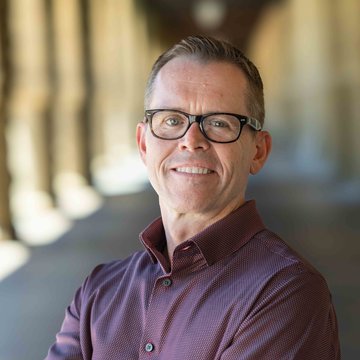What gets you going every day (besides coffee/tea/alarm clock), and what keeps you motivated?
I love puzzles and games, and every morning I play a few to get my mind working. Some of my favorites are Wordle, the NYT Spelling Bee, and Heardle. What keeps me motivated is the work that we do in higher education. I started my career in the private sector, but felt that I really found my calling when I started working in higher ed.
What IT initiatives/programs/goals are you most interested in pursuing in the next 2-3 years?
Wow, there are so many things! If I had to zero in on just a couple of projects, it would be working with our new H&S Web Services Associate Director Marion Marquard and her team to define a new digital/web strategy, and working with our H&S Applications Services Director Sean Brandt and his team on our multi-year data/BI roadmap. I’m excited about the myriad other initiatives that we have queued up in H&S IT.
How do your colleagues and team members help you achieve your vision? What challenges do you face?
My team members are really the ones that make the magic happen. They’re on the front line, and it’s their efforts and accomplishments that our stakeholders see and appreciate every day. Same goes for our colleagues and partners in UIT and across campus who we work closely with to deliver IT services. For my part, I try to focus on putting the plans, resources, processes, and systems in place that can help my team succeed. Of course, this requires us to work in close partnership to understand our stakeholders’ needs, where technology is headed, and how we might meet the challenges of the day, as well as the challenges of the future.
How do you decompress outside of work?
I love spending time with my family and friends, going on walks in Bidwell Park in Chico (one of the largest municipal parks in CA), traveling, golfing, and all things music. My undergraduate degree was in music, and I played guitar in bands until I was in my early 30s. My kids are teenagers now and one of our favorite activities is going to concerts and music festivals together. Ask me about some of my favorites next time you see me!
What advice would you give early or mid-career IT professionals looking to grow at Stanford?
Participate and learn as much as possible. In the earlier part of my career, I was mostly focused on the IT work that was immediately in front of me: web applications development, database engineering, and data warehousing. That was really exciting and engaging work, but I was limiting my growth. I really started to blossom when I branched out and started learning more about the rest of the IT organization, more about the rest of the organization outside of IT, and more about leadership, change management, governance, and so on.
I began attending more training/conferences, reading more articles/books, and participating in various campus work groups, such as student success advisory groups, governance committees, WASC accreditation steering committees, campus master planning, and strategic planning steering committees. That really helped me understand how the organization functions as a whole, and the role technology can take to support it all.


